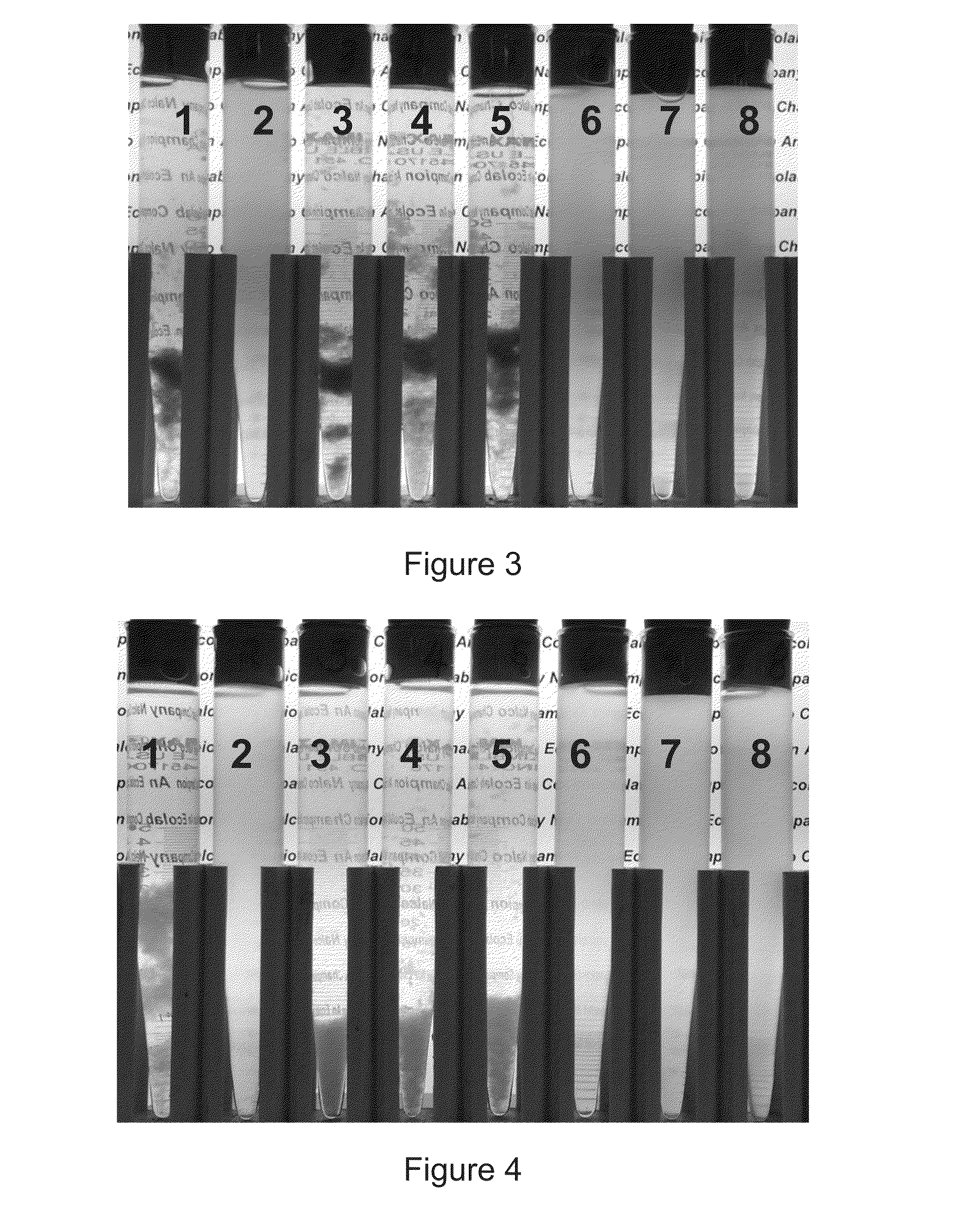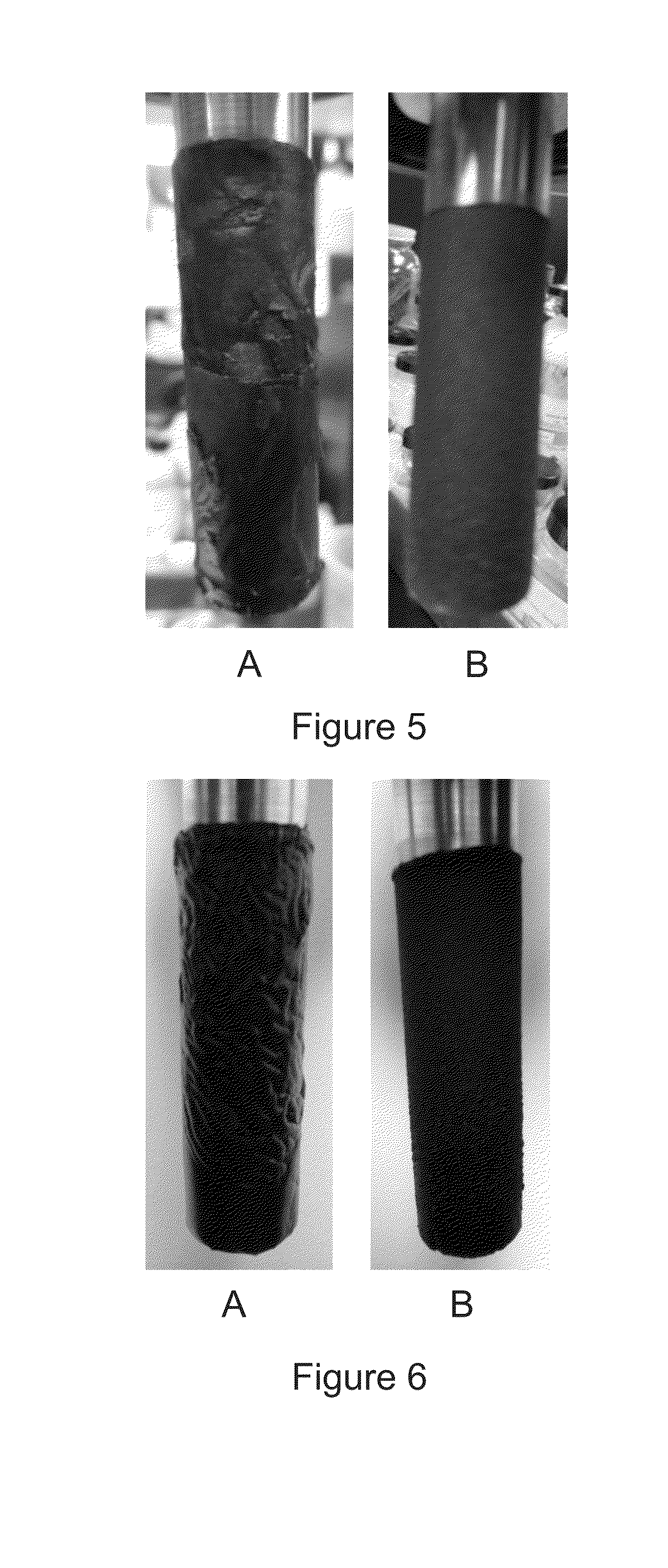Composition and method for dispersing paraffins in crude oils
- Summary
- Abstract
- Description
- Claims
- Application Information
AI Technical Summary
Benefits of technology
Problems solved by technology
Method used
Image
Examples
example 1
Polymer Synthesis
[0075]Non-Esterified Alpha-olefin-maleic anhydride co-polymer (non-esterified AOMA). 80 g of maleic anhydride (0.82 moles) and about 303 g of alpha-olefin (0.65 to 0.82 moles depending on average MW of the C12 to C30 alpha-olefin) were heated to 65 to 80° C. in a four necked round bottom flask to completely melt the reactants while stirring under nitrogen sweep. Once all materials are melted, nitrogen sweep was continued for an additional 15 minutes while maintaining the temperature at 65 to 80° C. The mixture was then heated further to 140° C. with continuous supply of nitrogen. Tertiary-butylperbenzoate in 1:1 (by weight) hydrocarbon solvent (Exxsol D80) was used as the initiator. The initiator solution was prepared by mixing 1.64 g of tert-butylperbenzoate (0.0084 moles) with equal amounts by weight of the solvent. The initiator solution was introduced in the reaction mixture in five equal shots (about 720 μl per shot) to control the temperature as the initiation...
example 2
Methyl Ethyl Ketone Test (MEK Test)
[0077]A simple test was developed for fast screening of candidate copolymers in dispersing wax in crude oils (e.g., tight oils such as Eagle Ford crudes). The test involved treating a warm crude sample with the copolymer additive followed by agitation. The sample is then diluted with methyl ethyl ketone (MEK) and let stand at room temperature. Wax is insoluble in MEK and a blank crude sample (without copolymer additive) gives a wax precipitate instantly. Certain copolymers have the tendency to disperse these precipitates. Copolymer additives that do not show activity give a precipitate similar to the blank crude sample. More specifically, the test was conducted as follows.
[0078]Crude oil samples were warmed at 52° C. in an oven (or a temperature above the wax appearance temperature (WAT) for the crude sample). 200 μl of 1% solution of copolymer additive was pipetted into each graduated centrifuge tube. 500 μl of warm crude sample was added into eac...
example 3
Cold Finger Test
[0084]The efficacy of the additive in preventing wax deposition was also evaluated by Cold Finger Test. The test was conducted using 100 ml of Eagle Ford crude oil maintained at 40° C. in a water bath while stirring at 180 rpm. The cold finger submerged in the sample was at 6° C. After 23 hours, the deposit was collected and wax inhibition was calculated using the formula below:
%waxinhibition=((wtwaxdepositinblank-wtwaxdepositwithadditive)wtwaxdepositinblank)×100
FIG. 5, panel A depicts the cold finger using blank crude oil, and panel B is the cold finger using crude oil treated with a non-esterified C30 AOMA. Likewise, FIG. 6, panel A depicts the cold finger using a different blank Eagle Ford crude oil and panel B is the cold finger using crude oil treated with esterified (C20-C28) styrene AOMA. The use of non-esterified and esterified C30 AOMA resulted in a 30 to 58% reduction in wax deposition under the conditions stated above at 400 to 600 ppm treatment rates. Add...
PUM
| Property | Measurement | Unit |
|---|---|---|
| Fraction | aaaaa | aaaaa |
| Gravity | aaaaa | aaaaa |
Abstract
Description
Claims
Application Information
 Login to View More
Login to View More - Generate Ideas
- Intellectual Property
- Life Sciences
- Materials
- Tech Scout
- Unparalleled Data Quality
- Higher Quality Content
- 60% Fewer Hallucinations
Browse by: Latest US Patents, China's latest patents, Technical Efficacy Thesaurus, Application Domain, Technology Topic, Popular Technical Reports.
© 2025 PatSnap. All rights reserved.Legal|Privacy policy|Modern Slavery Act Transparency Statement|Sitemap|About US| Contact US: help@patsnap.com



